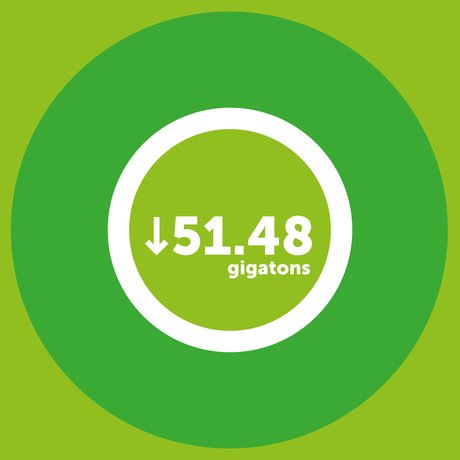Key message
Key challenges
- National education plans lack climate change content Out of 50 countries, despite mainstreaming climate change in the curricula, only 39% have a national law, policy or strategy specifically focused on climate change education and 63% of teacher training plans include a focus on climate change
(GEM, 2023) - Environmental learning proficiency has remained stagnant and low. Just 30% of all students are proficient in environmental science.
(GEM, 2021) - Half of all children globally — over one billion — are at an ‘extremely high risk’ to the impacts of climate change. And one-third of all children will be exposed to four or more extreme climate change hazards in the near future, including cyclones, drought, floods, heatwaves and others.
(UNICEF, 2021) - Climate disasters disrupt children's education. Climate disasters disrupt the education of nearly 40 million children annually, and this number continues to increase each year.
(UNICEF, 2023) - Children with lower levels of educational attainment are more vulnerable to environmental shocks and stresses When confronted by climate shocks, educated children, families and communities are often more empowered and adaptive in their disaster preparedness, response and recovery.
(UNICEF, 2021) - The younger generation will be most impacted by climate change Children will be most impacted by climate change. They will face more extreme weather events than the generations before them: seven times as many heat waves, twice as many wildfires and three times as many droughts, crop failures and river floods.
(Save the Children, 2021) - Levels of climate change awareness vary among students and teachers. Less than 40% of 58,000 teachers from 144 countries interviewed by UNESCO and Education International felt confident teaching the severity of climate change. 70% of 17,000 young people across 166 countries surveyed by UNESCO expressed concerns about the quality of climate change education: more than 9 in 10 students were informed about climate change in school but 27% could not explain it.
(UNESCO, 2023) - Many teachers don't feel confident enough to begin teaching their students about climate change. 95% of surveyed primary and secondary school teachers acknowledged the importance of teaching on climate change but less than 30% expressed a readiness to teach it.
(UNESCO, 2024)
Make the case
- Universal education and health interventions can have a direct impact on climate change. The resulting reductions in emissions globally could be as high as 68.9 gigatons of carbon dioxide between 2020 and 2050.
(Project Drawdown, 2020) - Girls’ education is one of the most effective tools we have to fight climate change. Using UNESCO data, projections show that educating girls could result in a massive reduction in emissions of 51.48 gigatons by 2050.
(Project Drawdown, 2017) - Education encourages the acquisition of skills required to adapt to climate change. Mainstreaming the latest knowledge and science on climate change ensures that children gain the skills that are relevant for the future of work, including the growing green economy and for livelihoods that are less susceptible to the impacts of a changing climate and degrading environment.
(UNICEF, 2021) - Providing environmental education to children has a ripple effect, with knowledge transferred to their families, inspiring action and reducing vulnerability. In the United States, intergenerational learning has proven to be an influential pathway for parental adoption of environmental concerns, ultimately changing harmful behaviour.
(Lawson et al., 2019) - Education saves lives. If universal upper-secondary was realised by 2030, 200,000 disaster-related deaths could be prevented in 20 years. If progress towards achieving education for all is halted, disaster-related deaths could increase by 20% per decade.
(GEM, 2016) - Increased education leads to higher levels of environmental concern and awareness. A study of nearly 30 countries found that 37% of people with secondary education and 46% of those with tertiary education were concerned for the environment, compared with 25% of those who did not start secondary education.
(UNICEF, 2015) (Franzen & Vogl, 2013) - Slowing population growth through education can reduce carbon emissions. A woman with 12 years of schooling has four to five fewer children than a woman with zero years of schooling, equivalent to a 25 metric ton reduction of carbon emissions.
(Kharas, 2016) (Carbon Dioxide Information Analysis Center, 2017) - A better educated labour force is essential to ensuring the technological transformation required to combat climate change. Education provides the basic, technical, and managerial skills necessary to innovate and develop green industries, transforming economies and food systems, and reducing environmental destruction. Green growth could produce up to 60 million additional jobs globally.
(Technopolis Group, 2015) (ILO, 2012) - Education promotes sustainable farming practices. Farmers educated in field schools reduced their environmental impact by 39%, and decreased pesticide use by 17%, while increasing their yield by 13%, and revenue by 19%.
(Waddington et al., 2014). - Disaster resilience increases with girls’ education. For each additional year of schooling a girl receives, her country’s resilience to climate disasters can be expected to improve by 3.2 points on the ND-GAIN Index, which measures climate change vulnerability.
(Brookings Institution, 2017) - Teachers think climate change education is important. In the United States, a recent study showed that 86% of teachers think climate change should be taught in classrooms.
(Kamenetz, 2019)
Key infographic

Closing the education financing gap in low- and lower-middle-income countries could reduce emissions by 51.48 gigatons by 2050.
Key opinion

Reem Al Hashimy
UAE Minister of State for International Cooperation
It cannot be business as usual; as long as we keep education confined within outdated, unambitious, and broken systems, we will continue to be in a vicious cycle where for every step forward we take, another pandemic, climate disaster, or conflict will set us back again, if not even further away from our goals to help people as well as the planet. The only way forward is to recognize that the pathway to meaningful progress towards 2030 and beyond must be through positioning education at the core of every single Sustainable Development Goal.
Key talking points
- The more a country invests in education, the more prepared it is to address the climate crisis.
- Education is a tool for providing important information about the climate and environment to young people.
- Higher levels of education are associated with more environmentally friendly lifestyles, increased skills for green-based technology jobs, and better farming practices.
- Several studies demonstrate additional investment in education can reduce carbon emissions.
Share This Resource
Similar Themes






